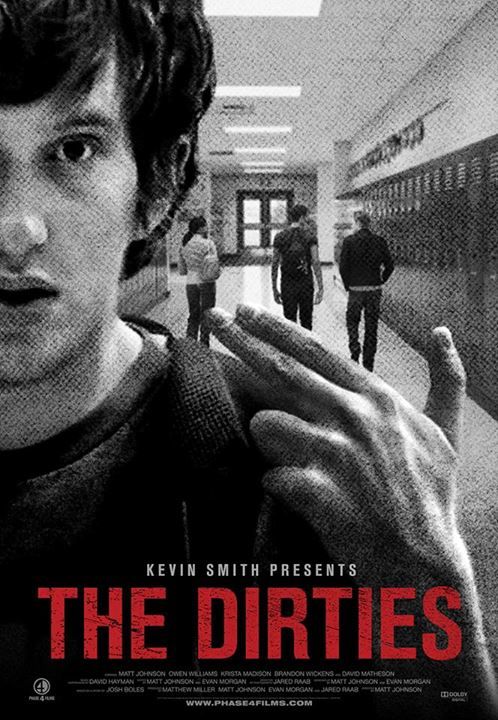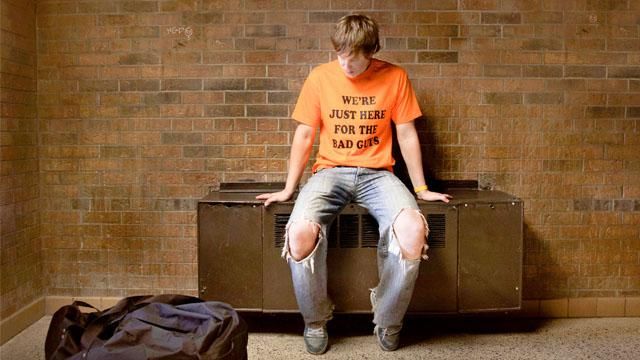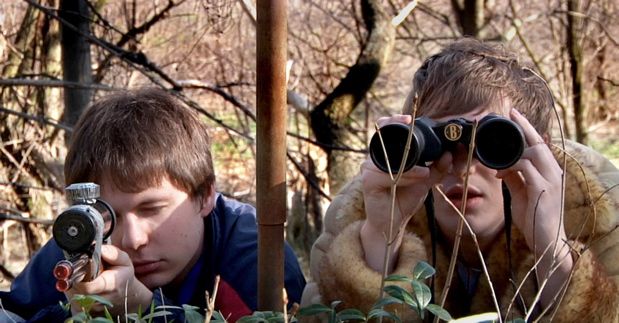One of geek culture’s elder statesmen lent his cred to a new generation at Comic-Con International in San Diego, as Kevin Smith promoted Matt Johnson’s directorial debut The Dirties to a crowded Hall H.
The film, whose trailer was premiered Saturday, revolves around Matt (played by Johnson, who also co-wrote the film) and Owen (played by Owen Williams), two friends who decide to make a comedy about getting revenge on bullies. But when Matt begins to think of the film as more than a joke, Owen has to decide whether his friend has taken their fantasy too far.
Winner of the Slamdance Film Festival’s Grand Jury Prize for Best Narrative Feature and the Spirit of Slamdance Award, The Dirties will be distributed by Phase 4 Films in partnership with the Kevin Smith Movie Club.
Talking with the press before the screening, Smith described The Dirties as “the best movie you’ll see all year.”
“For people that champion the Weinstein Company’s Bully documentary, this is the narrative version of that to some degree,” Smith said. “It takes you to a place that most movies don’t go, because it humanizes the person who is most villainized in the flick. I was incredibly moved. … Hands down, the best first feature I’ve ever seen. I loved Affleck’s Gone Baby Gone, but this is better.”
Johnson joked, “That’s not a fair comparison at all! [Affleck’s] been on 200 film sets!”
Smith said it was his goal to give as little input as possible on the film. “That’s the thing. If you love something, you’re not like, ‘Fuck it, let me put my stink all over it and make sure that you take my notes.’ It stands there by itself,” he said. “I wasn’t drawn to it thinking, 'How could I repair this?' in some way. It was irreparable, because it was perfect. At that point, there’s nothing to do but stand back and see if the boys like it. If they’re happy, it’s their movie. As long as I don’t see something like, he’s got bunnies on [the poster]. This feels very honest and organic to the flick. I think it’s interesting that you guys didn’t think about key art because there’s such a wonderful graphic presentation at the end during the credits with everybody’s font from [classic] movies.”
Johnson continued, “We’re completely obsessed with design. The end of the film is all rip-offs of super-famous movie openings and, in fact, we had a Clerks one there for a long time, but we took it out because we thought you’d sue us. And then you bought the film! I’m not kidding, it’s crazy.”
As the film deals with a school shooting, Johnson admitted to being worried about how it might come across to audiences. “We thought it was so amazing for people who know us and know that me and my friends are good guys [that] we’re not out not make a territorial film that’s trading on the issues of school shootings and school violence,” he said. “We thought anybody who read about the movie would think it’s trash and never watch it and never review it. As soon as Kevin and Phase 4 were like, ‘Oh, no, this is actually good,’ and then Slamdance gave us that award, it gave us a bridge to audiences that would never tolerate this type of thing just as an idea. It’s been the jumping off point for people to sit down and actually sit through the first 10 minutes and see that it isn’t exploitative and it isn’t stupid.”
Smith agreed that it’s tough to market a film about such a sensitive topic. “You could easily put someone off from watching it just by trying to describe the plot. It doesn’t do it justice,” he said. “If in any way, shape or form I can help get people to give it a watch, that’s my job. It’s not to come in and be like, ‘Let me show them how this shit’s done.’ Cause I’m sure you’d be like, ‘Hey, this guy made Copout!” I’m here to say these are the pitfalls, these are the things that might help get you to a larger audience, and then the most important thing I can do is just advocate."
“What the boys have been able to do is capture a side of the story you never see. You gotta understand where it all comes from,” Smith said, explaining how The Dirties approaches the topic of bullying in a new light. “We’ve seen many people in many PBS-type specials about why bullying is bad. I think that shit goes down like medicine, particularly to the people it’s meant for. No real bully is gonna watch a PBS special and go, ‘You’re right, I’m horrible.’”
Johnson interjected, “And no victim is gonna watch that and think, ‘This is somehow helping me.’”
Acting, writing and directing roles all fell to Johnson, who said he feels “the key to great art in general is to put yourself in an environment where things come easy to you. Anybody with a voice, unless they’re super-pretentious, like, experimental artists, which I think there’s a place for, too, you should be doing stuff that comes naturally to you that you don’t have to dig very deep to get to the gold.”
The Dirties is a deeply personal movie for Johnson, and combines his own experiences with those of school shooters he researched. “Well, I mean, the movie is about a super movie-obsessed kid. In that way, it is about my own life, but the whole thing is shot like a documentary,” he said. “In media classes, you have kids shooting other kids all the time, and this movie is just an extension of that. These kids just have cameras following them for what is ostensibly a school project for months at a time. You can see the main character Matt literally editing the footage together into the movie.
“You make movies about yourself,” he continued. “Eric Harris and Dylan Klebold made hundreds of movies about themselves, tons of them. And when you watch them, they’re funny kids trying to make one another laugh, which is the part of the story you never hear when you hear about Columbine, when you hear about anybody who’s doing something super-violent in school.
Johnson revealed the film was shot in a documentary style. “We never did second takes of anything,” he said. “We shot it like a documentary.”
“Our next movie will be better,” he promised. “It’s about the moon landing, it’s insane. It’s like The Dirties, but about the guys who fake the moon landing in the ‘60s.”
Explaining how cheap technology has created a boom in independent filmmaking, Smith said he thinks if he made Clerks today, it would be “way easier and way cheaper.”
“We could probably make the whole movie for like two grand or five grand. But it’d be way lost in the shuffle because of the democratization of tech and the industry itself,” he said. “Back when we started and we told people we were making an indie film, they’d be like, ‘What are you talking about?’ We’d say we were making a movie and they’d tell us, ‘You can’t make a movie!’ and shit like that. That’s all gone now because of stories like me, Robert Rodriguez, Richard Linklater, Spike Lee, people who just did it and then started a career off it, when it wasn’t as commonplace to be making a movie.
“You just realize it’s a way different world, man,” he continued. “We’re not all gunning for the theater any more. Some cats are just happy to get it to this stage of the game. So I wouldn’t have popped in this environment whatsoever, I’d be one of many people. Thank God I did it back when I did it. All I’ve got on my side, really, is longevity at this point. If I’d done [Clerks] now, nobody would have noticed. I probably wouldn’t have even tried to find a theatrical release for it. I’d put it up on YouTube in a couple parts or something.”
“What’s nice,” he said, “is that I sit down with so many younger filmmakers now. We do this podcast called ‘Film School Fridays,’ and you talk to these cats, or when you tour with a movie and do a Q&A after, you talk to these cats who are filmmakers and they tell me they’re making a film now with their friends. They explain it’s a $1,500 zombie epic and you’re like, ‘That’s adorable!’ Then they show you the trailer and it looks better than anything you’ve ever made.
“These cats just make flicks,” Smith continued. “They don’t sit there and go, ‘I’m putting all my eggs in this basket and I’m pulling the handle and hope it works out.’ That was the school of thought I came from. That’s all we knew. People had gone before me and done the same thing. Richard Linklater did it with Slacker, made this movie in the middle of nowhere, it went somewhere, somebody picked it up and his life changed. It’s different with these cats, they don’t wait for a gatekeeper to go, ‘Congratulations! All that time and effort was good, here’s a golden egg.’”
Johnson disagreed, however, saying, “Well, that did kind of happen to us. Literally, that’s what happened [when Smith discovered the film].”
Smith doesn’t think his endorsement is a golden egg, though. “A golden egg is a movie like Blair Witch that makes a billion dollars,” he countered.
Johnson added, “Even a story like Paranormal Activity that came out of Slamdance [isn’t possible any longer]. Even the landscape for that is changing because to market movies costs so many dozens and dozens of millions of dollars that there is no more instant success. That happens in television, it doesn’t really happen in films.”
Smith agreed, saying, “That’s another reason why it’s so easy to walk away from films: it’s too expensive to get it out. The expense is no longer making the art, it’s communicating the art to a potential audience. That’s where the true expense is. We have this cartoon movie, Jay and Silent Bob’s Super Groovy Cartoon Movie that we’ve been touring around the country. Doing great with it. Taking it from place to place as opposed to carpet-bombing the market. That movie cost $69,000 to make. Very inexpensive, so the moment we started selling tickets, it was in the black.
“Now if I wanted to take that movie into even a thousand theaters at the multiplex, I’d have to spend minimum 2 million bucks to let people know we’re gonna open on just a thousand screens. Then you spend a few more bucks and get to open on 2,000 screens. I would wind up spending a ridiculous amount of money to reach an audience to tell them we made a $69,000 cartoon. That’s why it’s a big business to make these found footage or smaller horror movies because it’s the old Miramax method. You make a very inexpensive movie and hope it pans out.”
Finally, Smith commented on how his Kevin Smith Movie Club, which tours films around the country, is his reaction to the film industry making it prohibitive to market smaller features. Referring to the now-infamous prediction of outrageous movie ticket prices in the near future by George Lucas and Steven Spielberg, Smith said, “They said that at a film symposium and people were like, ‘Holy shit! They predicted the end of the movie business!’ but I said the same stuff when I was out on tour with Red State. I said the same stuff during my Red State speech at Sundance and people were like, ‘You’re a fucking fat lunatic!’ I got ridiculed. I didn’t have enough credibility to say it the way [Lucas and Spielberg] did.
“People are pricing themselves out of the movie business,” he continued. “The problem is a movie like The Dirties and a movie like Despicable Me are competing on the same platform when it comes to advertising costs. You can keep your costs down on the ground to film; you can do that for nothing. You can convince people to take deferments and stuff, do anything you can to keep your budget down. But when it comes to advertising it in mass media, you can’t go to NBC and ask them to charge you less than they charge for Despicable Me commercials because we’re students. You’re playing on the same exact playing field.
“I’m not just talking about the independent filmmaker. The mid-range films are disappearing. There’s no longer $15- to $20-million movies. It’s easier for them to make two massive tentpole movies than it is to make one massive tentpole movie and six smaller movies to try and gamble. There’s no more gambling. All they have to do is pay the bills, not gamble anymore.”
However, Smith sees hope for aspiring filmmakers - on television. “That’s why TV over the past 20 years has become really fucking interesting,” he said. “You can do way more things there than you can do in cinema and you can do them inexpensively and you can switch horses in mid-stream. Changing anything about a movie is like trying to fucking turn the Titanic, but when you’re on TV, you can get feedback when an episode airs and be like, ‘Kill the next two episodes and just air the fourth one.’ You can self-correct. It’s more nimble like that. Movies just become too costly, particularly on the marketing side.”
The Dirties will be released Oct. 4 in theaters and on video on demand.




